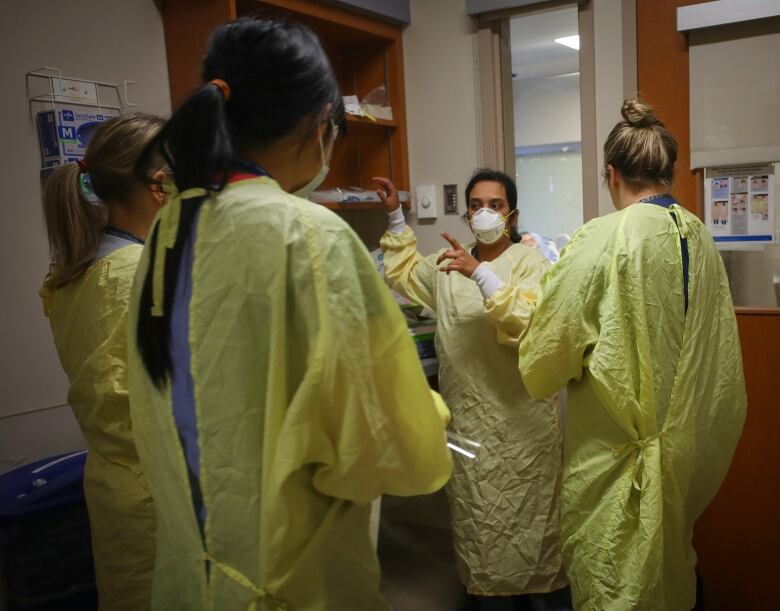Albertans who live alone will be allowed to visit one other household over holidays, premier says
People who live alone in Alberta will be allowed to attend one event at another household over the coming holiday long weekend, says Premier Jason Kenney.
A change to public health restrictions will allow these Albertans to visit another home on one occasion between Dec. 23 and Dec. 28, the premier announced Tuesday at a news conference.
“This is a small change that was just adopted based on advice from the minister of health, with input from the chief medical officer, by the COVID cabinet committee, and it will make a world of difference for single Albertans who otherwise would not be able to visit their families over Christmas,” Kenney said.
“Similarly, it will allow parents who would otherwise spend Christmas alone to welcome their children home for the holidays,” Kenney said, before cautioning: “Please know that the prohibition on large social gatherings remains over Christmas, and I regret that we could not make broader exemptions for holiday gatherings.”
During that time period, households may host up to two single people for an event, he said.
Dr. Deena Hinshaw, the province’s chief medical officer of health, said the one-time exemption will allow people who live alone to join another household for one gathering only, and a household can only host one event, with a maximum of two people who live alone, not including children.
“This approach strives to balance mental wellness for individuals living alone and the need to limit COVID-19 spread,” Hinshaw said.
“To be clear, we are providing a five-day window from Dec. 23 to 28 to accommodate schedules for first responders and others who may work variable shifts. However, an individual living alone may only attend one gathering during this time.”
The premier said additional social contact will somewhat increase the risk of transmission, but the government tried to balance that off against other considerations.
“We know that Christmastime, for lots of reasons, is bound up with people’s emotional and mental health, and we don’t want to make the already serious mental-health crisis in the province even more serious for people being completely isolated at Christmastime,” he said.
Alberta reported 1,021 new cases on Tuesday, the lowest number since Nov. 25. Another 11 deaths were reported, bringing the total to 871. The province had 18,311 active cases, continuing the downward trend that has been seen for more than a week.
Across the province, 802 people were in hospital being treated for the illness, including 152 in intensive care units.
Kenney said the province has made “tremendous progress” in fighting COVID-19 over the last couple of weeks.
The huge spike in cases seen over the past two months clearly began around dining room tables at Thanksgiving or at other gatherings where people did not expect to spread the virus, he said.
Many of the people who attended those gatherings went on to become hospitalized. Some even died, he said.
“If we were to gather in typical large extended-family gatherings over the holidays, beginning with 800 people in hospital, there is absolutely no doubt that we would lose all of the progress that we have made in recent weeks,” he said.
“We would be back into exponential growth, and it wouldn’t take very much for those 800 cases in hospital to turn into 1,600, and for the 1,600 to turn into 3,200, and at that point we would be completely overwhelming our health-care system.”
There is already “extraordinary pressure” on the health-care system, but the province can cope with that thanks to the dedication of front-line health-care workers, Kennedy said.
“We can manage with 800 cases in hospital. We cannot manage with 2,500 COVID cases in hospital without beginning to deny some people care and without cancelling all non-urgent surgeries and non-COIVID related non-urgent health care.
“This is not a theory. This is not a model. This is not a political preference. It is a simple, hard, numerical reality of the pressure on the health-care system, which without these kinds of difficult restrictions and measures would, within a matter of weeks, undoubtedly overwhelm Alberta’s health-care system.”
Alberta has received a second shipment of the Pfizer-BioNTech vaccine, which will be offered to health-care workers and long-term care workers across the province, Health Minister Tyler Shandro announced at the same news conference.
From that shipment, a total of 25,350 doses will be delivered to vaccine sites around Alberta. Calgary and Edmonton will each receive 6,825 doses and Red Deer will receive 1,950. The rest will be distributed equally to sites in Brooks, Camrose, Drumheller, Edson, Fort McMurray, Grande Prairie, Lethbridge, Medicine Hat, Pincher Creek and St. Paul.
As of Monday, Shandro said, 3,074 Alberta health-care workers had received their first shots.
“It’s a bit of good news, and it’s a bit of good news that we need,” he said. “It’s the beginning of the work that will roll back the pandemic once and for all. But it’s only a small first step. In the meantime, we have to hold the pandemic back by following the restrictions that are in place over the holiday.”
Active cases peaked recently at slightly more than 21,000, he said, and have since dropped to around 18,000.
“That’s real improvement, and it’s happening because the daily case count is going down,” Shandro said. “It looks like we’re finally headed in the right direction here in Alberta.
He implored the public to continue limiting their social contacts.
“If we stop following the restrictions over the holiday, the numbers will not keep going down,” he said. “We’ll see, in fact, a whole other spike. And it’s that simple.
“So my message today is just this: we’re doing the right thing, it’s working, and we need to stick at it.”




